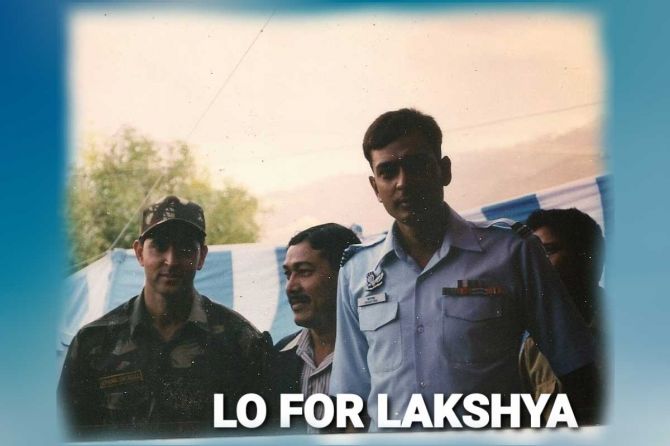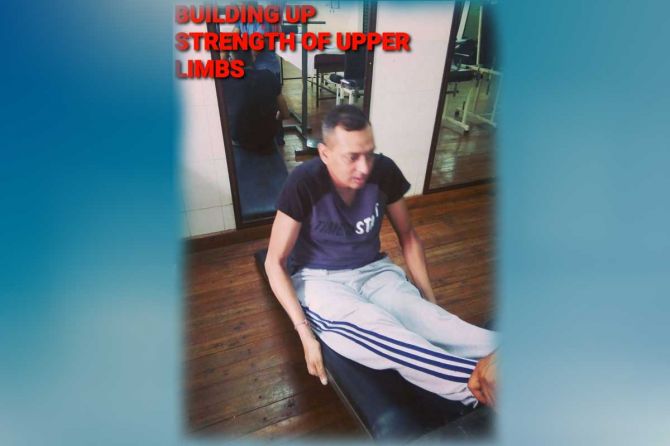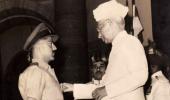'Life has changed so much for me.'
'I have accepted this new normal and understood the power of positive thinking.'
'I am grateful to God that I am alive and he has made me differently-abled for a greater cause,' Wing Commander Shantanu tells Air Commodore Nitin Sathe (retd) on World Disability Day.

One has to be at the right place at the right time in the Armed Forces.
"I was on my bike heading to office at 0620.
"Work started at 0630 and I was on time.
"As an air traffic controller, I remembered how I used to head for the underground complex to carry out the preflight briefing of the aircrew every morning.
"Now, I was carrying out a more mundane but important 'administrative' job at the Hasimara Air Force Station (West Bengal) where I was posted.
"The road near my office had very recently been recarpeted and there was still a bit of gravel lying around.
"I remembered telling my warrant officer to get it removed lest someone has a fall.
"But the gravel was still there and I made a mental note to get it cleared pronto," says Wing Commander Shantanu.
And then it happened.
At the turn leading to his office, Shantanu's bike skidded at low speed.
He was smart enough to stop himself from falling but he went off the road; the front tyre hit the ditch and came to a halt with a jerk.
Feet on the ground with the bike held between his legs, he tried to dismount but found that his legs were frozen.
Some airmen passing by came to help him off and called for an ambulance.
"At first I thought that some nerve had been damaged," says Shantanu.

He was quickly packed off to the hospital in Binaguri, West Bengal), but it did not have the expertise and equipment to start the necessary treatment.
Shantanu took matters into his own hands and called up Air HQ for help.
Soon, he was on his way in a helicopter to the base hospital at Bagdogra in Darjeeling district, 120 km away.
The CT scan machine at this hospital was unserviceable as well while the initial X-Ray showed some damage to the spine, besides 13 broken ribs.

Shantanu was critical and the doctors advised air evacuation to the Command Hospital in Kolkata.
His lungs had been punctured by the broken ribs and were slowly filling up with blood.
The doctors feared he would have breathing difficulties during the evacuation and inserted a tube into his lungs to drain the fluid.
What happened after this is a blur for Shantanu.
After reaching Kolkata, he was admitted into the ICU and received care from the best doctors.
He was slipping in and out of consciousness and his chances of survival were diminishing.
His spine was operated on as he continued his struggle for survival.

His marriage had been solemnised just a few months ago and his wife worked in a multinational in Kolkata.
She was informed of the accident and was soon by his bedside.
Shantanu had already slipped into coma by then.
Sujata recalls the time her husband was comatose for two months.
"I was so distressed by the whole scene; my husband had tubes attached to all parts of his body and his face was under a transparent mask.
"Only I was allowed to be with him for brief intervals and the doctors tried to explain to me what the problem was.
"I would just nod, not understanding anything due to the confusion in my mind.
"I only kept looking at his face behind the mask, wondering when he would be able to talk and walk again."

"I was a mediocre student from a middle-class family, all of whom were intellectuals," says Shantanu.
"My father was a college professor and mother, a high school teacher.
"There was therefore a lot of pressure on me to become 'something' at the earliest.
"I tried my hand at becoming a doctor, a CA and an MBA.
"Finding that I had no interest in any of these subjects, I decided to appear for the NDA exam with two of my friends. Surprisingly, all three of us cleared the exam!' he smiles.
While his friends passed their interview and went on to train at the NDA, Shantanu did not qualify and was soon home pursuing his graduation in commerce.
"But I thought I was the right material for the Army and continued to dream of joining the force," he says.

Post his graduation, he appeared for all the competitive exams for the armed forces and qualified in the interview stage for the army, the police and the IAF.
After deliberations with his brother, he chose to join the IAF.
"During the initial training at the AFA, I wondered if I was in the right place with all the physicals and all.
"But soon I was comfortable and did well in my course as an air traffic controller," says Shantanu.
Post his training, he was assigned to Pathankot, Punjab, manning the air traffic from the control tower.

"The greatest experience of my life was to be sent to the Siachen glacier during the Kargil operations of 1999.
"I was at the base camp all through the war and have vivid memories of that time," Shantanu tells me.
"We were in the thick of action by the time I reached the base camp at the glacier."
It is from here that all the helicopters operate to look after our brave men guarding the heights of the highest battlefield in the world.
Flying carried on from daybreak to sunset and there was so much excitement.
"Since radio silence was being observed, one had to just wait for the helicopters to return from their mission -- their sound in the valley was so pleasing to the ears!" he says.

"We had to rush to our bunkers when the shelling started.
"Waiting in the dark, with only a candle light brightening things inside, I was educated by my fellow seniors who had seen so much of action already.
"One night, as the deafening blasts of shells falling shook the earth around us, some shrapnel penetrated our shelters and thudded into the soft earth.
"I felt something wet behind my ears.
"There was no pain, maybe due to the extreme cold but I was bleeding profusely," says Shantanu.
The wound was cleaned; thankfully, it was just a nick at the tip of his ear.
Post Kargil, he volunteered for a posting to Leh from where he was again deputed to work in the glacier; a tenure he remembers with fondness.
He was also deputed to get the new runway at Kargil operational and he remembers with pride how the then Commander-in-Chief Air Marshal Bhatia walked out of the AN-32 and congratulated him on a job well done.
After serving in the most demanding of places on earth, he did a number of routine postings all over the country, gaining experience and becoming a SATCO (Senior Air Traffic Control Officer).
"Controlling finally left me when I was selected as the Staff Officer to the AoC-in -C of an IAF command.
"This was a new job for me and I started learning about staff work and administration from this point," he says.

In 2016, he married Sujata and moved to Hasimara as the deputy chief administrative officer.
On the morning of January 24, 2017, the tragic accident took place. It almost ended his life.
Well, almost.
Two months into coma, he started stirring and opening his eyes.
The doctors saw hope in the fact that he was finally responding to stimuli.
"I used to keep reading to him from spiritual books, from Buddhist scriptures.
"My family and friends were praying for him at many of the shrines along the length and breath of the country.
"It is because of their sincere prayers and the hard work of the doctors, nurses and attendants that my husband came out of it alive," says Sujata.
She fought mental trauma even as she battled alongside her husband during the two months he spent in the ICU.
But this was not the end.
Shantanu came out of the trauma but went into depression as he moved to Pune for his rehabilitation.

Soon the tubes were removed; Shantanu was off the life support systems and able to do simple things on his own.
He now required a lot of tender loving care to bring him back to normalcy.
"All along, I thought that he would walk one day.
"When the neurologist explained to me that this would be a distant dream at best, I decided that both of us would come out of this and live a fairy tale life," says Sujata.
Sadly, despite the fact that he was physically strong now, Shantanu went into depression.
What followed were extensive mood swings, negative thoughts and tears.
His behaviour became erratic; he was shouting at people and crying at the same time.
During this time, he was seeing an occupational therapist, Sameer Ranjan.
It was Ranjan who helped him out of his negative thoughts and made him realise that there was more to life.
"All this had to pass; I was positive it would," says Sujata.
In Pune, where he went to recover physically and mentally, the IAF decided to get Shantanu to undergo extensive physio and rehabilitation.
"I too had gained a lot of weight during this ordeal and we both decided that the mantra of our life henceforth would be to be healthy and strong," says Sujata.

Shantanu started hydro therapy as part of his rehab programme and learnt to swim with his upper body.
His mentor and coach realised his potential and made him practise hard for the state level Paralympics competition.
Shantanu proved him right and went on to win two medals in his chosen events; he was also selected for the Nationals.
During practice at the pool one day, Colonel Gaurav Dutta of the army rowing node came visiting.
Seeing Shantanu's strength and ability, he invited him to try out rowing.
Shantanu was soon comfortable with this sport under the watchful eyes of the national coach, Ismail.
He was initially rowing with another trainer who was there to rescue him should the boat capsize.
"Once I was confident of myself, I went solo and started my practice for the Asian Para Rowing Camp and championship to be held in Korea.
"On one day, the winds were strong and I went under as the boat capsized.
"I was quickly able to release my top harness but my feet were secured too tight and I wasn't able to release them," says Shantanu.
After being underwater for what seemed an eternity, Shantanu gathered all his strength, broke himself free from the boat and swam to safety.
There was no stopping this champion now.
He was soon in Korea and stood fifth amongst rowers from 20 countries, a proud achievement considering the fact that he had started practising the sport barely five months earlier.

Today, Shantanu is the first Indian 'para rower' and the first rower from the IAF.
"Shantanu gets irritable when he can't work out, especially during the lockdown, since we have been confined to our homes. So we decided to have a full fledged gym with special equipment at home.
"The army rowing node has been kind enough to give us a rowing machine at home which Shantanu uses extensively to practise.
"In all this, I also have lost 25 kg of weight!" laughs Sujata.
"I will always stand by my husband and help him realise his dreams.
"I am studying nutritional science online so that I can give him the best diet and ensure his good health at all times.
"I want both of us to be happy, live independently and stay strong.
"That is the mantra of our lives and I shall follow it come what may," she says confidently.
"Life has changed so much for me," says Shantanu.
"I have now accepted this new normal and understood the power of positive thinking.
"I am grateful to God that I am alive and he has made me differently-abled for a greater cause.
"Always count on your blessings and stop cribbing about what you don't have."
Air Commodore Nitin Sathe retired from the Indian Air Force in February 2020 after a distinguished 35 year career.
The author of three books, you can read Air Commodore Sathe's earlier contributions here.
Feature Presentation: Ashish Narsale/Rediff.com












 © 2025
© 2025